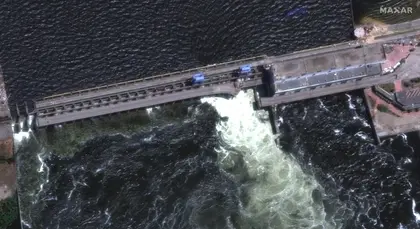LATEST: 7 Things You Need to Know About the Kakhovka Dam Disaster
Ukraine has said Russian forces blew up and “completely destroyed” the Soviet-era Nova Kakhovka dam in the occupied Kherson region overnight, prompting mass evacuations and an emergency meeting in Kyiv.
JOIN US ON TELEGRAM
Follow our coverage of the war on the @Kyivpost_official.
“The Kakhovka HPP was blown up by the Russian occupying forces,” the military said in a post on Facebook.
“The scale of the destruction, the speed and volume of water, the probable areas of flooding are currently being established.
“All services are working. The situation is being monitored.”
A press release from Ukrhydroenergo later said the dam had been “completely destroyed,” adding: “The station cannot be restored.”
Video posted to social media showed water pouring through a huge hole in the dam structure.
The Nova Kakhovka dam on Dnipro in Kyiv is no more.
— Tymofiy Mylovanov (@Mylovanov) June 6, 2023
This is now confirmed on Ukrainian news. Ukraine states that the dam was blown up by Russians. Russians deny the dam is blown.
If true, people will die and it is a war crime 1/
pic.twitter.com/xOm3sRbJjF
The dam holds a vast amount of water from the Dnipro River upstream from the city of Kherson. It supplies water to the Russian-occupied Crimean peninsula as well as to the Zaporizhzhia nuclear plant, also under Russian control.
Ukraine's energy operator Energoatom, said on Tuesday morning that the situation at the nuclear power plant was under control. The UN's nuclear watchdog also said on Tuesday it saw “no immediate nuclear safety risk” at the plant.
“The IAEA is aware of reports of damage at Ukraine's Kakhovka dam; IAEA experts at Zaporizhzhia Nuclear Power Plant are closely monitoring the situation; no immediate nuclear safety risk at plant,” the International Atomic Energy Agency (IAEA) said in a tweet.

‘We Need to End That Horrible, Horrible War’ – Ukraine at War Update for Dec. 23
The Russian terrorist state has destroyed the dam at Nova Kakhovka.
— Michael MacKay (@mhmck) June 6, 2023
Massive flooding of the Dnipro River is underway, downstream to the city of Kherson.
This is a monstrous war crime. pic.twitter.com/7UO3CA4FQo
Oleksandr Prokudin, the head of the Kherson Regional Military Administration, announced on Telegram that evacuations were underway in the right bank of the river which is under Ukrainian control.
“The evacuation of residents from dangerous areas has begun,” he said. “All services are working. The emergency services, police officers, the military are all nearby.
“Please take documents and essential items and wait for the evacuation buses.”
He added later in the morning that 16,000 people on the right bank of Kherson are in the critical zone.
Kyiv later said 17,000 people were being evacuated and 24 settlements had been flooded.
"Over 40,000 people are in danger of being flooded. Ukrainian authorities are evacuating over 17,000 people," Andriy Kostin, Ukraine's Prosecutor General, said on social media, adding that 25,000 more people should be evacuated on the Russian-occupied side of the Dnipro River.
Videos posted to social media on Tuesday morning showed flood waters pouring into coastal villages.
❗️This is what #Kherson and #NovaKakhovka look like now pic.twitter.com/8p5UsmVXLC
— KyivPost (@KyivPost) June 6, 2023
On the left bank, currently under Russian control, the city of Nova Kakhovka, which is home to the dam, was flooded, officials said.
Russian television showed images of the city that lies on the Dnipro river with its central square entirely flooded and swans swimming near the main Soviet-era house of culture.
"Water is rising," Vladimir Leontyev, the Russian-installed head of the city administration, said on Telegram.
He said 53 buses were being sent by authorities to take people from Novaya Kakhovka and two nearby settlements to safe areas.
Ukraine on Tuesday said 150 tonnes of engine oil had spilled into the Dnipro river after the attack.
Preliminary reports suggest a zoo has been flooded and unverified videos posted to social media show animals wandering the streets.
The park in Nova #Kakhovka, where the zoo was located, is flooded. It is not yet known what happened to the animals. In Kherson, beavers are fleeing from flooding pic.twitter.com/7SssAr4K7z
— Olga Konsevych (@Liza22Frank) June 6, 2023
In Kyiv, President Zelensky urgently convened his Security Council after the explosion, it was announced.
He later said the "world must react" to the Kakhovka dam attack, blaming Russia for the breach which has caused extensive flooding.
Ukraine branded Russia a "terrorist state" at the International Court of Justice, saying the destruction of the dam was part of a campaign of violence dating back years.
"Just today, Russia blew up a major dam located in Nova Kakhovka, causing significant civilian evacuations, harsh ecological damages," Ukraine's representative Anton Korynevych told the top UN court.
"Russia's actions are the actions of a terrorist state, an aggressor."
The Geneva Conventions prohibit attacks on dams unless "it is used for other than its normal function and in regular, significant and direct support of military operations and if such attack is the only feasible way to terminate such support," an exemption that would not apply to the Nova Kakhovk dam.
Andriy Yusov, a representative of Ukrainian military intelligence, told Kyiv Post Russia’s actions were “terrorist act, ecocide,” adding: “Last year, Ukrainian military intelligence reported that the Kakhovka hydroelectric power station had been mined by Russian troops, publishing photo, and video evidence.
“The Russian occupiers were never interested in the fate of the local population. The policy was to evict and relocate the local population, but it did not meet with the support of the residents of the Kherson region.
“This terrorist act is significant for the evidence formation base on the tribunal against Putin and his supporters.”
Ukraine's Minister of Foreign Affairs, Dmytro Kuleba, said Russian forces had "inflicted probably Europe’s largest technological disaster in decades and put thousands of civilians at risk".
He added: "This is a heinous war crime. The only way to stop Russia, the greatest terrorist of the 21st century, is to kick it out of Ukraine."
Russia destroyed the Kakhovka dam inflicting probably Europe’s largest technological disaster in decades and putting thousands of civilians at risk. This is a heinous war crime. The only way to stop Russia, the greatest terrorist of the 21st century, is to kick it out of Ukraine.
— Dmytro Kuleba (@DmytroKuleba) June 6, 2023
EU chief Charles Michel on Tuesday expressed shock at the attack on Ukraine's Nova Kakhovka dam and pledged to hold Russia accountable for the "war crime" of destroying civilian infrastructure.
"Shocked by the unprecedented attack of the Nova Kakhovka dam. The destruction of civilian infrastructure clearly qualifies as a war crime – and we will hold Russia and its proxies accountable," he wrote on social media.
The Kremlin claimed the attack was "deliberate sabotage" by Kyiv, conducted in an attempt to cut off Russian-occupied Crimea from water.
"We can already unequivocally declare (this was) deliberate sabotage by the Ukrainian side," Kremlin spokesman Dmitry Peskov said. "One of the aims was to deprive Crimea of water."
The 3.3-kilometre-long (two-mile-long) dam was captured by Russian forces at the beginning of the invasion on February 24, 2022, along with its hydroelectric power station.
You can also highlight the text and press Ctrl + Enter









